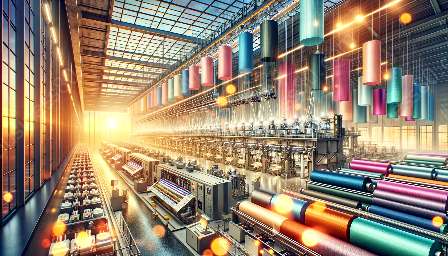Sustainability has become a key focus in the textile and apparel supply chain, with a growing emphasis on eco-friendly materials, ethical sourcing, and sustainable production practices. In this topic cluster, we will explore the concept of sustainable supply chain in the context of the textiles and nonwovens industry, highlighting its significance, challenges, and best practices.
The Significance of Sustainable Supply Chain
The textile and apparel industry plays a significant role in the global economy, but it also has a considerable environmental and social impact. The concept of sustainable supply chain aims to address these impacts by promoting responsible sourcing, ethical production, and eco-friendly practices throughout the value chain.
Environmental Benefits
By incorporating sustainable practices into the supply chain, textile and apparel companies can reduce their carbon footprint, minimize resource consumption, and limit overall environmental impact. This includes utilizing eco-friendly materials, implementing energy-efficient manufacturing processes, and reducing waste and pollution.
Social Impact
Furthermore, sustainable supply chain practices also directly impact the workers and communities involved in textile and apparel production. Ethical sourcing and responsible production not only help to improve working conditions and livelihoods but also contribute to overall social well-being.
Challenges in Sustainable Supply Chain
While the benefits of sustainable supply chain are evident, there are several challenges that companies face in implementing and maintaining such practices. These challenges include finding sustainable raw materials, ensuring ethical sourcing, investing in sustainable technologies, and maintaining cost-effectiveness.
Raw Material Sourcing
One of the primary challenges in the textile and apparel supply chain is the sourcing of sustainable raw materials. The industry is heavily reliant on materials such as cotton, which often involve high water consumption and pesticide use. Finding eco-friendly alternatives and ensuring a transparent and ethical supply chain can be complex.
Production Processes
Implementing sustainable production processes and technologies, such as water-saving dyeing techniques and energy-efficient manufacturing, poses another challenge. Companies must invest in innovative solutions that align with sustainable goals while also being economically viable.
Cost Considerations
Additionally, cost considerations can often hinder the implementation of sustainable supply chain practices. Balancing sustainability with profitability requires strategic planning and careful consideration of investments in sustainable initiatives.
Best Practices for Sustainable Supply Chain
Despite the challenges, many textile and apparel companies have successfully integrated sustainable practices into their supply chain. Some best practices include:
- Implementing Eco-Friendly Materials: Investing in organic cotton, recycled polyester, and other sustainable fibers to reduce environmental impact.
- Engaging in Ethical Sourcing: Working closely with suppliers to ensure fair labor practices, ethical sourcing of materials, and transparency throughout the supply chain.
- Adopting Sustainable Technologies: Incorporating energy-efficient machinery, eco-friendly dyeing and finishing processes, and waste-reducing technologies.
- Collaborating with Stakeholders: Partnering with stakeholders across the supply chain, including suppliers, manufacturers, and consumers, to collectively promote sustainability.
- Measuring and Reporting Impact: Establishing key performance indicators (KPIs) to measure the environmental and social impact of the supply chain and reporting progress transparently.
Sustainability in Textiles & Nonwovens
When it comes to the textiles and nonwovens sector, sustainability is equally crucial. Through sustainable supply chain practices, textile and nonwovens companies can minimize waste, reduce energy consumption, and ensure ethical sourcing of raw materials, all of which contribute to a more sustainable industry overall.
Conclusion
Sustainable supply chain is a pivotal aspect of the textile and apparel industry, promoting environmental stewardship, ethical production, and social responsibility. By embracing sustainable practices, companies can not only mitigate their environmental impact but also foster a positive social and economic influence. The textile and nonwovens sector, in particular, plays a vital role in driving sustainability across the supply chain, emphasizing the need for collaborative efforts and innovative solutions.

